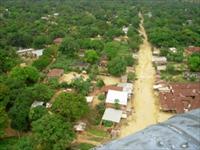ROC: Security and humanitarian conditions improve in Pool region

Saturday, June 7, 2008
Security
and humanitarian conditions in the Pool region of the Republic of Congo
have improved significantly in recent months despite a political
deadlock that has prevented a key former rebel leader taking up his
government post in the capital, Brazzaville, humanitarian officials
have said.
"Médecins Sans Frontières (MSF) has decided to leave the Congo because the humanitarian context has changed. It has improved considerably," Lai-Ling Lee, the head of the MSF mission in the country, said.
"In 2007 we registered fewer incidents [in the Pool region] than in the years before," Lee reported. "We are handing over to the local authorities to provide the people with the necessary interventions." MSF has been providing humanitarian assistance in the Pool region since 1998.
The improved security has also allowed for the dismantling of road blocks erected by security forces and ex-combatants in the region.
"All the barriers have been removed," Col. Ibata Yhomby, the regional commander of the police force in Brazzaville, said. "The accomplishment of this operation is a great relief for the people of Pool." The Pool region was the most affected in the country's series of civil wars between 1998 and 2003.
The war pitted the national army against former rebel leader Pasteur Ntoumi's ninja figthers. The signing of a peace agreement between Ntoumi's party, Le Conseil national des républicains (CNR) and the government, in March 2003, ended the conflict.
Ntoumi was appointed general delegate in charge of the promotion of peace and post-conflict reconstruction by presidential decree in May 2007 but is yet to take up his post. His party is calling for the formation of a security commission comprising law enforcement officers, ex-combatants and representatives of the civil society and human rights organisations.
"If the reverend has still not taken [up] his post it is because of lethargy on the part of the government. The ball is in the government's court," CNR spokesman, Euloge Mpassi, said. "Ntoumi is still ready to come to Brazzaville to take up his position."
However, according to the commissioner in charge of the reintegration of ex-combatants, Michel Ngakala, Ntoumi had not returned to Brazzaville simply because he did not wish to.
"The war ended and he is free to move anywhere," Ngakala said. "Given that Ntoumi will take up the role as a civilian, he does not need any special formal provisions in order to be installed."
"Taking up a civilian role does not require such structures which risk complicating the situation," he said.
Initially, Ntoumi was scheduled to return to the capital on 10 September
2007 to take up his post, after spending at least 10 years in the bush.
Despite improved security in the region, Ntoumi's ex-combatants are still terrorising the people in Pool, according to the director of the Congolese human rights watchdog, Roger Bouka Owoko.
At least 5,000 of Ntoumi's forces are expected to take part in the country's demobilisation, disarmament and reintegration programme.
"Médecins Sans Frontières (MSF) has decided to leave the Congo because the humanitarian context has changed. It has improved considerably," Lai-Ling Lee, the head of the MSF mission in the country, said.
"In 2007 we registered fewer incidents [in the Pool region] than in the years before," Lee reported. "We are handing over to the local authorities to provide the people with the necessary interventions." MSF has been providing humanitarian assistance in the Pool region since 1998.
The improved security has also allowed for the dismantling of road blocks erected by security forces and ex-combatants in the region.
"All the barriers have been removed," Col. Ibata Yhomby, the regional commander of the police force in Brazzaville, said. "The accomplishment of this operation is a great relief for the people of Pool." The Pool region was the most affected in the country's series of civil wars between 1998 and 2003.
The war pitted the national army against former rebel leader Pasteur Ntoumi's ninja figthers. The signing of a peace agreement between Ntoumi's party, Le Conseil national des républicains (CNR) and the government, in March 2003, ended the conflict.
Ntoumi was appointed general delegate in charge of the promotion of peace and post-conflict reconstruction by presidential decree in May 2007 but is yet to take up his post. His party is calling for the formation of a security commission comprising law enforcement officers, ex-combatants and representatives of the civil society and human rights organisations.
"If the reverend has still not taken [up] his post it is because of lethargy on the part of the government. The ball is in the government's court," CNR spokesman, Euloge Mpassi, said. "Ntoumi is still ready to come to Brazzaville to take up his position."
However, according to the commissioner in charge of the reintegration of ex-combatants, Michel Ngakala, Ntoumi had not returned to Brazzaville simply because he did not wish to.
"The war ended and he is free to move anywhere," Ngakala said. "Given that Ntoumi will take up the role as a civilian, he does not need any special formal provisions in order to be installed."
"Taking up a civilian role does not require such structures which risk complicating the situation," he said.
Initially, Ntoumi was scheduled to return to the capital on 10 September
2007 to take up his post, after spending at least 10 years in the bush.
Despite improved security in the region, Ntoumi's ex-combatants are still terrorising the people in Pool, according to the director of the Congolese human rights watchdog, Roger Bouka Owoko.
At least 5,000 of Ntoumi's forces are expected to take part in the country's demobilisation, disarmament and reintegration programme.
Source: IRIN NEWS http://irinnews.org
 Back and Next - Back and Next
Back and Next - Back and Next See Also - See Also
See Also - See Also